Don't Overlook the Importance of Your Child's Eyesight
 With the business of back-to-school preparedness, it's easy for parents to overlook one of the most important items on the checklist: an annual eye exam.
With the business of back-to-school preparedness, it's easy for parents to overlook one of the most important items on the checklist: an annual eye exam.
Just like back-to-school physicals and regular dental check-ups, it's vitally important that your child's eyesight be part of their annual wellness plan. This goes for preschool kids all the way up to teenagers.
According to the American Optometric Association (AOA), one in four school-age children has a vision disorder that, if gone untreated, can affect their learning, behavior, and overall school adjustment. If you notice your child or teenager squinting, reading too close, covering one eye, rubbing their eyes, complaining of headaches, or exhibiting a short attention span, it's time to see an eye doctor. The good news is, when caught early, most eye problems can be treated.
The first step is to set up a comprehensive eye exam with an optometrist for your child or teen. These eye exams go into much more depth than the annual vision screening your child receives at their annual physical.
A Doctor of Optometry will conduct a variety of tests based on your child's overall health history, and whether any family members have a history of vision disorders. From there, your child will be tested for:
- Visual acuity – Evaluates how well each eye is seeing based on reading charts.
- Visual function – Analyzes depth perception, color vision, eye muscle movements, peripheral vision, and how the pupils respond to light.
- Keratometry/topography – A measure of the curvature of the cornea, particularly critical for fitting contact lenses.
- Refraction – Determines the lens power needed to compensate for nearsightedness, farsightedness, or astigmatism.
- Eye focusing / Eye teaming / Eye movement – Determines how well your eyes focus, move, and work together to see a clear, single image.
- Overall eye health – Dilating eye drops are often used to widen the pupil and provide a better view of the structures inside the eye. Surrounding tissues are also evaluated, as well as the pressure inside the eye.
The American Optometric Association recommends that all children receive their first eye exam at 6 to 12 months of age, or as recommended by their pediatrician. They should receive another eye exam at least once between 3 and 5 years of age, and once again before first grade. A pediatrician can perform basic vision screenings at every appointment, but they may recommend an eye doctor if they notice vision abnormalities.
After that, all children ages 6-18 should receive an annual eye exam, or a comprehensive eye exam as recommended for those who have vision problems or a history of family eye disorders. Comprehensive eye exams can be scheduled at any time of the year, but it's especially helpful if you get your child's appointment on the calendar at the start of each new school year. Contact one of CentraCare's Eye Center locations to schedule a comprehensive exam.
Most health insurance plans cover comprehensive eye exams for children every year. Some plans may even cover the cost of new glasses on an annual basis. For questions regarding your coverage, contact your individual health plan.
Just remember, back to school = back to the eye doctor!